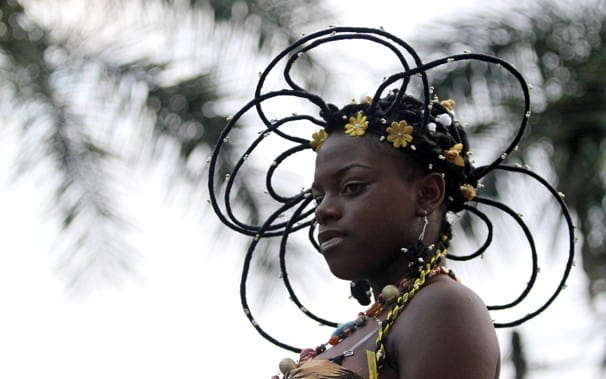“You need to make your hair.”
There was a tinge of insensitivity in her booming voice, but neither contempt nor malice. All activity came to a halt, the dragging of chairs on the tiled floor stopped, the murmurs died down. A hush fell over the room. Emmy shifted uneasily in her chair as 50 pairs of eyes landed on her head. She could feel them fixated on her hair. From somewhere in the back, two people giggled. She quickly cast her eyes down as little pools formed in them. One or two drops of a clear liquid fell on her chest.
SEE ALSO: African Patriarchy: Remnants of the Empire That Need To Be Dismantled
Keep Up With Face2Face Africa On Facebook!
She slowly raised her head, and her eyes landed on that of the woman who was standing before her, the woman who had dropped the bombshell, the woman who had made her feel less beautiful. She was a shade of black, just like her. She wore a blue dress that ended just above the knees. Her pink knee-high boots were matched with a pink waist belt. Her hair was straight, tied in a push-back using a black hair clip.
She was undeniably beautiful.
As Emmy walked out of class that evening, she studied everyone’s hair. Most were braided, using different shades of hair additions: blonde, maroon, brown. Some were relaxed; others wore weaves.
Truly, her hair stood out.
It was hard for someone not to notice it: black with a tinge of brown, bushy, and tied up in a bun. The only White lady in her class had her hair braided into a pony tail and secured by two rubber bands.
She was the only one who wore her hair natural besides Emmy.
As she studied her hair that evening, she couldn’t help but feel annoyed. She slowly became angry at her lecturer. She wanted to walk up to her and remind her that the White girl, too, needed to make her hair, that hers, too, was natural just like Emmy’s. She wanted to remind her that if nothing is wrong with silky and blonde, then nothing ought to be wrong with a shade of black, bushy, and coarse. She wanted to remind her that just like the way blonde and silky can never be unofficial in a White face, black, bushy. and coarse should never be unofficial in a Black face.
That mid-morning experience in the scorching heat of January and the stillness of trees remained ingrained in Emmy’s mind. “She made her hair” alright, but she couldn’t help wondering for how long we are going to remain mentally colonized. She kept asking herself when the end to this kind of slavery would come. She kept longing for the beautiful morning that we, Africans, will start appreciating that which is truly African, that which is made at home for us and by us.
For the first time, she sat down and asked herself ‘who came up with a list of official hair styles, what inclusion or exclusion criteria did they use, why do we African women in the cities feel that when we leave our hair without the weaves or the hair additions or the blond wigs, we feel odd, a little needy, a little less confident?
Why is it a shame to wear your natural fro but classy to wear a blond Afro wig?

20 photos
Our minds are still colonized, our beliefs are wrong.
We need to sit and change the lists that were handed down to us. Let us not judge those of us who love ourselves so much as to not to wear weaves. We are Black women, we come in different shades. We love who we are and what we are. When we criminalize natural, we promote fake. When we say natural is unofficial, we encourage synthetic, We break the hearts of those who went before us, those who stood before the world and let everyone know that Black is indeed beautiful. We break the heart of Martin Luther King; Mandela is disturbed in his rest when Black people discriminate against Black and being Black.
We have maybe had an experience like Emmy’s or worse. One or two people have had negative things to say about our hair. Probably no one marveled at your Black hair. Maybe someone has told you that they prefer your weave. Some mean ones have told you that you look malnourished when you have worn your hair natural.
Hey, sister, you are a shade of black, and you are beautiful, made in the image of the maker of heavens and earth. Remember this day that all shades of black are beautiful. We are beautiful, we are Black, and we are Black sisters. We cannot forsake our mothers, we cannot deny our parents; let nothing separate you from being a daughter of this land. Let not your demeanor, your words, or your feelings forsake your descent. Remember to embrace who you are, let us love us then others will learn to love us. Let us embrace this new freedom, the freedom of being Black.
SEE ALSO: Words To Live By: Love Yourself
_____________________________________________
Face2face Africa invites you to join us for our annual Pan-African Weekend July 25-27 in NYC, honoring Dr. Mo Ibrahim, Alek Wek, Femi Kuti, Masai Ujiri, Bethlehem Alemu, and Dr. Oheneba Bochie-Adjei. Click here for more details and register to attend.





























